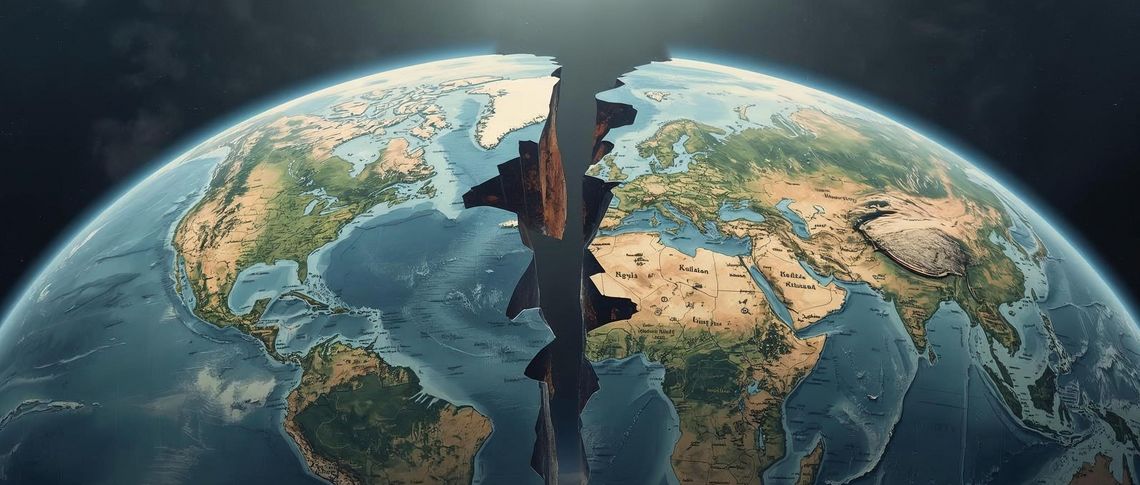President Trump’s speech at the UN General Assembly suggested a further US retreat from multilateralism. What does this mean for the international order?
I don’t think it’s just a retreat – it’s an attack on multilateralism. Many of the assumptions the world has long operated on are being challenged. Take climate change: we’ve always had deniers, but when the US President calls it a con game, that’s serious. The US is the world’s number one economy, and domestically they’ve already reversed many previous climate policies, pushing for more fossil fuel use. Whether one agrees or not, the direction is clear.
On trade, Trump has attacked the WTO system. He’s also changing the terms of engagement with America’s allies through his tariff policies. We are at a critical moment in the evolution of multilateralism – both since 1945 and after 1991.
If the US withdraws from multilateral institutions or multilateralism in general, which powers are best positioned to fill that vacuum?
I don’t think it’s really possible for any single power to fill that space. China talks a lot about multilateralism, about global order and globalisation. But its own approach raises problems. It has weaponised trade, it controls about 40 per cent of global manufacturing, and it has used its monopoly on rare earths as leverage. That makes it hard for China to present itself as a credible guarantor of the global order. And if China keeps exporting on such a massive scale while importing very little, that kind of imbalance is simply not sustainable as the basis for a new system.
What we actually need is both the United States and China to adjust their approaches. Even within the Trump administration, some officials have recognised that what we are seeing on trade and the WTO is only the beginning of a larger renegotiation. At some point, the leading economies will have to sit down together and agree on new rules – either through a grand negotiation like the old WTO rounds, or in a smaller group of major economies whose framework others later adopt.
Multilateralism since 1945 has largely worked in the economic sphere. It has never functioned effectively in the political or security domain. Still, specialised agencies – the World Health Organization, the International Labour Organization, the International Telecommunication Union, and others, some of them even predating the UN – have proven resilient and will continue. On the economic side, a fresh framework is needed. When it comes to security, the UN has never really worked as a security provider, and it likely never will.
Many in the West speak of defending the so-called ‘rules-based order.’ If we look at the wars in Ukraine and Gaza, is it a thing of the past?
Hypocrisy has always been part of international life. At best, the rules-based order is an aspiration. In reality, it is more often violated than respected. If you look at the post-1945 world, the so-called liberal international order never really applied to how Western countries dealt with the non-Western world. The coups, the interventions, all of that. During the Cold War, almost anything was justified in the name of the larger strategic game.
After 1991, there was a sense that the US and the West could finally set and enforce global rules. But that moment lasted barely a decade. For a while, you could imagine building the supranational structures needed for such an order. But once Russia stopped playing along and began reasserting itself, and once China rose, that framework quickly became unsustainable.
US policy in the Middle East also never really fit the idea of a rules-based order — it has exposed the gap between the West’s rhetoric and its actual conduct. What we are left with is not rules but a raw contest of power. Simply repeating the phrase ‘rules-based order’ doesn’t get us anywhere anymore.
The war in Ukraine shows no sign of abating. What concrete advice would you offer European governments on how to proceed?
Europe today is really in a deep crisis. Russia is a strong military power and has attacked its neighbour. At the same time, the US is sending very uncertain signals about whether it will actually stay the course. In America, many people ask why the country should be fighting wars in faraway places. So, there is huge uncertainty about the US support for Ukraine. The Biden administration used to say: ‘we will defend Ukraine, with whatever it takes.’ Trump is not saying that. In fact, he thinks trading territory for peace might be a good idea. Now, some of his positions keep shifting, but he has already introduced enough uncertainty to force Europe into doing much more on its own.
Whether Europe can get its act together in the short term looks doubtful. But in the longer run, the time has come for Europe to plan for real deterrence against the Russian challenge. Think about it. Europe’s economy is nearly $20 trillion, Russia’s is around $2 trillion. The idea that Europe cannot build up the defences to deal with Russia is simply ridiculous. The resources and the capacity are there. The problems are about manpower, arms production, and political will. But history shows that circumstances can force countries to do things they didn’t think they could do.
You spoke of uncertainty under Trump. We’ve also seen his stance toward India shift – from cultivating a close personal relationship with Prime Minister Modi to imposing steep tariffs and publicly criticising him. How do you see this change?
India has adopted a new strategy. Don’t argue with him in public, but stay firm on the issues. I don’t think the relationship has collapsed just because of Trump’s maverick behaviour. After all, Trump is not the United States. As president he has enormous powers, yes, but the bigger investment the US has made in India – in the Indo-Pacific, in constructing a regional balance of power – that’s not going to disappear just because Trump lashes out and makes India collateral damage in his fight with Russia.
My sense is this is not the end of the story. He has already calmed down a little bit. India and the US can still come out of this, because both sides share a fundamental interest in a stable Asia, and that interest is not going away. By contrast, US-China relations will remain difficult, even if Trump believes he can cut a deal with Xi Jinping, just as he once thought he could cut a deal with Putin. Those attempts didn’t go very far. India, meanwhile, is big enough to grin and bear it. It can continue to engage with Trump without panicking.
India also maintains close ties with Russia, which in Europe many view as highly problematic. Images of Modi warmly embracing Putin at the Shanghai Cooperation Organisation drew sharp criticism. How do you see this?
First of all, let’s not forget that Germany maintained a solid relationship with Russia even after the Crimea invasion. Between 2014 and 2022, Germany didn’t stop its economic engagement with Russia. I understand the anger in Europe, but there is also an overestimation of India’s relationship with Moscow.
Historically, the ties go back a long way. For the Indian national movement, which came of age in the interwar period, the Soviet Union was seen as a liberator — anti-colonial, anti-imperialist. That sentiment is still in our DNA. In India, we never really experienced Russia’s imperial behaviour in Europe. During the Cold War, India and the Soviet Union grew close, while the US and Europe aligned with Pakistan. That legacy continues to linger.
At the same time, Russia’s weight in India’s overall security has already begun to decline. Russia’s GDP is about $2 trillion, India’s around $4 trillion, and India is growing much faster. So, the gap will only widen. India has also worked to diversify away from Russian weapons by buying more from France, Israel and the US. The Ukraine war and discounted oil purchases have given the relationship renewed visibility, but structurally it is quite limited – it’s mostly about oil and defence. There is little commerce beyond that, little people-to-people contact. It is not a thriving relationship.
But if Europe tells India, you cannot trade with Putin, while at the same time Trump is openly talking about cutting deals with Russia and American oil companies want access there — that does look like double standards.
At the same time, I agree that India also needs to better understand European concerns about Russia’s aggression. There is a tendency not to see it, because we have no historical memory of Russia as an imperial power in Europe. For us, Russia was always seen as a progressive force. The same is true in Africa and elsewhere. That is where we need to understand each other better: our histories, and where we are coming from.
There has been growing talk recently of a potential rapprochement between India and China. What is your opinion on the situation?
India has a serious dilemma when it comes to China. On the one hand, China is a huge neighbour, and we share a 3 800-kilometre disputed border. We need peaceful coexistence. On the other hand, we also have to balance against China’s territorial assertiveness. We have to do both: build a reasonable relationship while at the same time making sure our security interests are protected.
The same dilemma exists on the economic side. China is the world’s second-largest economy, and we need to trade with them. For decades, India believed that closer trade would help ease political tensions. But today, the economic relationship itself has become a problem. We run a $100 billion trade deficit, and much of our manufacturing has been undercut by Chinese dumping. Yet we can’t simply cut China off, because many of our own exports still depend on Chinese imports.
That is why we need to craft a new kind of relationship, one that deals with both the economic imbalance and the border issue. What Prime Minister Modi did in meeting Xi Jinping at the Shanghai Cooperation Organisation was not a breakthrough, but a resumption of dialogue. After the border crisis of Ladakh in 2020, everything was frozen. Now there is an attempt to unfreeze the relationship. It is a much-needed step, but I would not expect any strategic breakthroughs in the near term.
Don’t you see China as a threat? After all, the entire US pivot to Asia is supposed to contain Beijing.
Of course, it is a threat – in fact, a much bigger one for us than for Europe. For you, China is a market, an opportunity. For us, it’s a neighbour with whom we share territorial disagreements, economic frictions, and tensions about China’s ties with Pakistan and Bangladesh. You can’t really ‘contain’ China. You need both: balancing and negotiating. That’s the challenge for India: to manage the disputes while finding a way to coexist with a very powerful neighbour.
This interview was conducted by Nikolaos Gavalakis.






